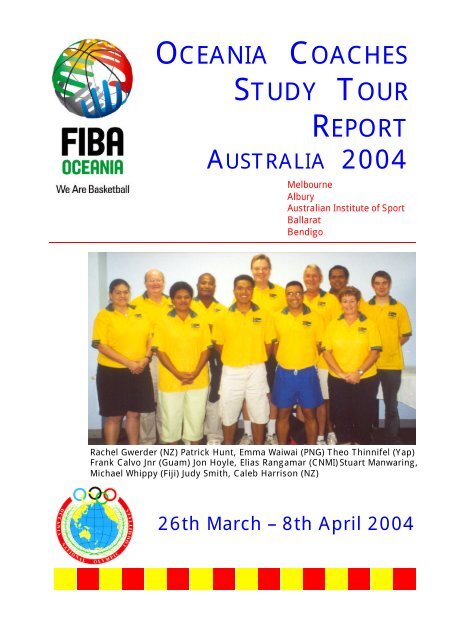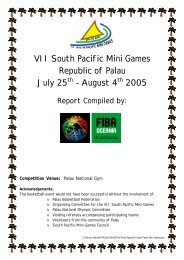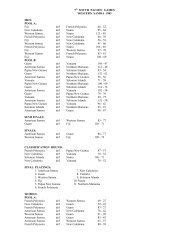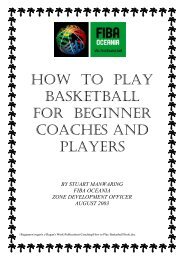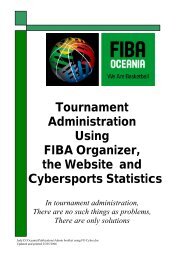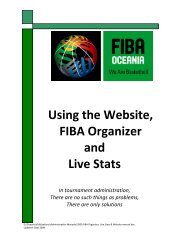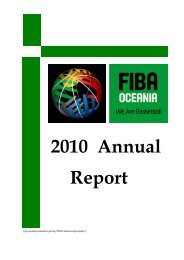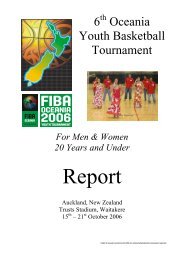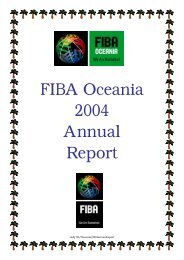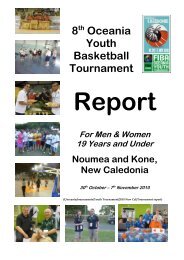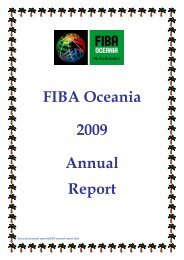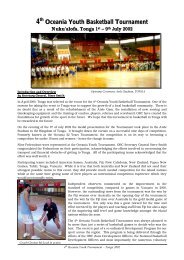OCEANIA COACHES STUDY TOUR REPORT - Fiba Oceania
OCEANIA COACHES STUDY TOUR REPORT - Fiba Oceania
OCEANIA COACHES STUDY TOUR REPORT - Fiba Oceania
Create successful ePaper yourself
Turn your PDF publications into a flip-book with our unique Google optimized e-Paper software.
<strong>OCEANIA</strong> <strong>COACHES</strong><br />
<strong>STUDY</strong> <strong>TOUR</strong><br />
<strong>REPORT</strong><br />
AUSTRALIA 2004<br />
Melbourne<br />
Albury<br />
Australian Institute of Sport<br />
Ballarat<br />
Bendigo<br />
Rachel Gwerder (NZ) Patrick Hunt, Emma Waiwai (PNG) Theo Thinnifel (Yap)<br />
Frank Calvo Jnr (Guam) Jon Hoyle, Elias Rangamar (CNMI) Stuart Manwaring,<br />
Michael Whippy (Fiji) Judy Smith, Caleb Harrison (NZ)<br />
26th March – 8th April 2004
TABLE OF CONTENTS<br />
<strong>REPORT</strong> FROM PATRICK HUNT....................................................................................3<br />
PROGRAM OUTLINE:........................................................................................................5<br />
PARTICIPANT DETAILS....................................................................................................6<br />
COMMENTS AND OBSERVATIONS FROM THE <strong>COACHES</strong>: ....................................7<br />
<strong>REPORT</strong> FROM MICHAEL WHIPPY OF FIJI: ..............................................................8<br />
<strong>REPORT</strong> FROM RACHEL GWERDER OF NEW ZEALAND .....................................9<br />
<strong>REPORT</strong> FROM CALEB HARRISON OF NEW ZEALAND:.......................................11<br />
<strong>REPORT</strong> BY THEO THINNIFEL OF YAP......................................................................12<br />
<strong>REPORT</strong> BY STUART MANWARING............................................................................13<br />
OPERATIONAL <strong>REPORT</strong>: ...............................................................................................14<br />
PHOTO GALLERY............................................................................................................15<br />
FIBA <strong>Oceania</strong> Coaches Study Tour to Australia 2004<br />
2
<strong>Oceania</strong> Coaches Study Tour to Australia 2004<br />
Report By Patrick Hunt<br />
President, FIBA <strong>Oceania</strong><br />
World Association of Basketball Coaches<br />
Introduction:<br />
Every two years coaches from Basketball Australia’ s Intensive Training Centre Program (ITCP) embark on<br />
an international study tour to USA and Europe. Funding support for the study tour is provided by<br />
Basketball Australia, the state/territory basketball associations, the relevant state/territory Institutes of<br />
Sport, the participating coaches and the World Association of Basketball Coaches through FIBA <strong>Oceania</strong>.<br />
Steve Smith, Secretary General of FIBA <strong>Oceania</strong>, has had several discussions with me raising the<br />
suggestion of having a similar study tour for coaches from throughout the FIBA <strong>Oceania</strong> region, with the<br />
coaches visiting Australia.<br />
Steve Smith was able to obtain funding for the study tour from the World Association of Basketball<br />
Coaches and the <strong>Oceania</strong> National Olympic Committee, with the coaches also making a personal<br />
contribution.<br />
The study tour eventuated with the coaches visiting Australia from 26 th March to 6 th April 2004.<br />
Aims:<br />
The purpose of the study tour was to expose coaches to a variety of programs ranging from junior<br />
women’s and junior men’s, senior men and women at ABA level and also to visit the Australian Institute of<br />
Sport in Canberra.<br />
Through group discussion and feedback sessions the program aimed to share information from practice<br />
sessions and programs in an endeavour to expand coaching expertise and knowledge.<br />
Format:<br />
Coaches discussed team practice sessions, games, received coaching presentations, attended coaching<br />
clinics and individual practice sessions. They then had the opportunity to ask questions and discuss<br />
elements of the practice sessions, games or coaching sessions with the coaches who were involved in<br />
conducting the sessions.<br />
Itinerary:<br />
A very comprehensive schedule was organised through the Intensive Training Centre Program in Victoria<br />
Metropolitan (Melbourne) and Victoria Country, Bendigo and Ballarat and at the Australian Institute of<br />
Sport in Canberra. The program was organised through Basketball Australia’s ITCP bank of coaches and<br />
AIS coaches through Patrick Hunt National ITCP Head Coach and FIBA <strong>Oceania</strong> WABC President.<br />
Observations:<br />
The study tour was most ably led by Jon Hoyle and Stuart Manwaring, FIBA <strong>Oceania</strong> Development<br />
Officers and Judy Smith FIBA <strong>Oceania</strong> Administrative assistant. I was able to join the study tour for the<br />
last 5 days during the visits to the AIS Basketball program in Canberra and programs in Ballarat and<br />
Bendigo.<br />
I was most impressed by the way the group interacted and willingly joined in the discussions sessions on<br />
what had been observed. I was able to lead several of these sessions and the exchange of information and<br />
views was most beneficial to all coaches.<br />
The scouting exercises were challenging, practical and covered both scouting of individual players and<br />
team systems of play.<br />
It was pleasing to note the willingness of the Australian coaches conducting the sessions to share<br />
information and provide resources wherever possible.<br />
FIBA <strong>Oceania</strong> Coaches Study Tour to Australia 2004<br />
3
The inaugural FIBA <strong>Oceania</strong> Coaches Study Tour was a most educational and worthwhile venture.<br />
Feedback from participating coaches has indicated that it has proved to be a most significant event in<br />
helping them further their coaching expertise and broaden their coaching programs.<br />
Thanks to the following people and organisation for making this tremendous event possible:<br />
� FIBA <strong>Oceania</strong><br />
� <strong>Oceania</strong> National Olympic Committee<br />
� World Association of Basketball Coaches<br />
� Jon Hoyle, Stuart Manwaring and Judy Smith from FIBA <strong>Oceania</strong><br />
� Steve Smith, FIBA <strong>Oceania</strong> Secretary General<br />
� AIS coaches Phil Brown, Martin Clarke, Debbie Cook, Paul Goriss<br />
� ITCP Head Coaches in Victoria, Ross Wignall and Marty Handson<br />
� Basketball Australia President John Maddock<br />
� Basketball Victoria<br />
� Lindsay Gaze<br />
This coaching milestone for basketball in FIBA <strong>Oceania</strong> should take place every two years.<br />
The challenge for the participating coaches is to now implement and integrate this most valuable<br />
information into their own programs, which will sustain the growth of our tremendous game throughout<br />
the FIBA <strong>Oceania</strong> region.<br />
A group discussion in Bendigo, lead by Patrick Hunt.<br />
The tour group at the Australian Institute of Sport<br />
FIBA <strong>Oceania</strong> Coaches Study Tour to Australia 2004<br />
4
Friday 26 th March<br />
Melbourne<br />
Saturday 27 th March<br />
Melbourne<br />
Sunday 28 th March<br />
Melbourne<br />
Monday 29 th March<br />
Melbourne<br />
Tuesday 30 th March<br />
Melbourne<br />
Wednesday 31 st March<br />
Albury<br />
Thursday 1 st April<br />
Canberra.<br />
Australian Institute of<br />
Sport<br />
Friday 2 nd April<br />
Canberra.<br />
Australian Institute of<br />
Sport<br />
Saturday 3 rd April<br />
Ballarat<br />
Sunday 4 th April<br />
Bendigo<br />
Monday 5 th April<br />
Bendigo<br />
Tuesday 6th April<br />
Melbourne<br />
Wednesday 7th April<br />
Melbourne<br />
Thursday 8th April<br />
Melbourne<br />
Program Outline:<br />
Coaches and staff arrive Tullamarine airport, Melbourne<br />
Coaches arrive<br />
4.00pm Victoria Metropolitan U/16 girls State training Marissa<br />
Fillipou & Julianne Grant – MSAC courts<br />
Scouting exercise at ABA games. Coaches to attend pregame<br />
6.00pm ABA game Kilsyth v Knox Women<br />
8.00pm ABA game Kilsyth v Knox Men<br />
9.00am Dandenong Junior representative team practices.<br />
Eddie Calic – Development Officer<br />
Scouting exercise at ABA games. Attend pre game talk<br />
12.00 ABA game Frankston v Kilsyth women<br />
2.00pm ABA game Frankston v Dandenong men<br />
6.30am ITCP individual sessions – Kew High School<br />
Explanation of ITCP by Ross Wignall, Vic Metro ITCP Coach<br />
9.30am Box Hill Secondary School –Sessions with Kevin Goorjian<br />
7.00pm Man defence & motion offence against the zone<br />
by Patrick Hunt at Werribee Basketball stadium<br />
6.30am ITCP individual sessions – Waverley Basketball stadium<br />
10.00am Meeting with Lindsay Gaze at Basketball Victoria headquarters<br />
6.00pm ITCP coaches meeting with Patrick Hunt<br />
7.00pm Vic Metro full ITCP squad practice<br />
Travel to Albury.<br />
Observe stadium activities in a multi use<br />
facility. Observe senior basketball competitions<br />
Travel to AIS in Canberra.<br />
1.30pm Sports massage & training<br />
4.30pm Girls team practice<br />
1.30pm Boys video session<br />
4.30pm Boys team practice<br />
6.30am Girls weights session<br />
8.30am Girls individual sessions, boys shooting session<br />
12.30pm Girls individual session, boys preparation for game<br />
4.30pm Girls team practice<br />
7.30pm AIS v Frankston men at AIS<br />
2.30pm Under 18 boys & girls State trials<br />
7.30pm ABA game Ballarat v Bendigo women<br />
12.30pm State under 12 championships Future Stars program<br />
2.30pm Junior squad training with Bendigo coaches<br />
9.00am Meeting with Ben Harvey & Wayne Larkin – explanation of<br />
domestic and representative programs at Bendigo<br />
2.00pm Future Stars finals<br />
4.00pm ITC individual session<br />
5.00pm Bendigo Braves ABA team weights session<br />
12.30pm Tour wrap-up and luncheon at Box Hill TAFE.<br />
Presentation by John Maddock, President of Basketball Australia<br />
Coaches and staff depart<br />
Coaches depart<br />
FIBA <strong>Oceania</strong> Coaches Study Tour to Australia 2004<br />
5
Participant Details<br />
Name Country Address<br />
Caleb Harrison New Zealand<br />
Theo Thinnifel Yap<br />
Frank Calvo Jnr Guam<br />
Michael Whippy Fiji<br />
Emma Waiwai PNG<br />
Rachel Gwerder New Zealand<br />
Elias Rangamar Mariana Islands<br />
Jon Hoyle Australia<br />
Stuart Manwaring Australia<br />
Judy Smith Australia<br />
Patrick Hunt Australia<br />
2 Golden Elm Lane, Christchurch<br />
New Zealand<br />
PO Box 909, Colonia, Yap<br />
Federated States of Micronesia 96943<br />
UOG Field House, UOG Station,<br />
Mangilao Guam<br />
56 Le Hunte St, Suva<br />
Fiji Islands<br />
PO Box 2180, Boroko, Port Moresby<br />
Papua New Guinea<br />
52 Clarkin Road, Hamilton<br />
New Zealand<br />
PO Box 2476, Saipan<br />
Northern Mariana Islands 96950<br />
21 Pacific Highway, Adamstown<br />
Heights NSW 2289<br />
3 Carumbi Place, Isabella Plains<br />
ACT 2905<br />
18 Sea Breeze Place, Boambee<br />
NSW 2452<br />
PO Box 176 Belconnen<br />
ACT 2616<br />
Plyometrics drill at Waverly early morning ITCP session<br />
FIBA <strong>Oceania</strong> Coaches Study Tour to Australia 2004<br />
6<br />
Email<br />
caleb@globe.net.nz<br />
fishyap@mail.fm<br />
kocalvo@uog9.uog.edu<br />
prosurvis2@connect.com.fj<br />
ewaiwai@hotmail.com<br />
rachelbball@xtra.co.nz<br />
eli_rangamar@yahoo.com<br />
obcjon@yahoo.com.au<br />
obcstuart@yahoo.com.au<br />
obcjudy@tpg.com.au<br />
patrick.hunt@ausport.gov.au
Comments and observations from the coaches:<br />
What were the positive aspects of the tour<br />
� The openness of the Australian coaches impressed me. (this comment was repeated by<br />
every coach)<br />
� While the ITCP has outcomes to achieve, each coach within the network teaches<br />
differently, according to their personality. The athletes benefit from this approach. In my<br />
country there is a standard coaching method, which makes me feel like a sheep, following<br />
the leader. The tour has made me realise that coaching to my personality is most<br />
important and it is something I now feel I can do with confidence.<br />
� The opportunity to discuss among the tour group was great.<br />
� Learnt a great deal about scouting (comment repeated by most coaches)<br />
� Will encourage coaches in my country to share their knowledge (comment by all coaches)<br />
� Impressed with the drive and enthusiasm shown by Australian coaches, administrators –<br />
everyone.<br />
� Allowed me to pick up new drills and teaching points (repeated by a number of coaches)<br />
� Shocked to see how associations follow the same offensive and defensive principles for<br />
their representative teams – something unheard of in my country, but something very<br />
valuable once you understand the philosophy behind it.<br />
� The amount and detail of information gained has been mind-boggling.<br />
� I have grown as a coach, now feels confident to undertake large clinics in my home<br />
country.<br />
� Struck by the ability and knowledge of the under 12 players – just amazing and like<br />
nothing I have ever seen before. No wonder Australia is such a great basketball nation.<br />
� I have learnt that starting with the basics at an early age is the most important thing to<br />
change in my country.<br />
� We in the islands pride ourselves on our hospitality, but I have been amazed at the<br />
hospitality extended to us in every stadium and town we have visited.<br />
� I was amazed at how well the daily schedule was planned, and how it ran to time – even<br />
little things like using the mobile phone to call ahead to confirm our arrival time. Things<br />
like that just don’t happen in my country.<br />
What would you change for the next tour?<br />
� More discussions with coaches after games.<br />
� Follow a selected team for a longer period of time – observe their training, pregame, game<br />
and post game activities. Give us an opportunity to see ‘how it all fits together’.<br />
� Have a similar tour within our own country.<br />
� Each participant to write a report on basketball in their country and present to the group<br />
at the beginning of the tour.<br />
� Have more coaches from my country involved in the tour, although I am aware of the<br />
financial aspect of such a comment on FIBA <strong>Oceania</strong> (comment repeated by most coaches)<br />
� Program the tour to commence with under 12 activities and then move up in ability levels<br />
from there.<br />
� Make the tour longer.<br />
Most commonly heard phrases:<br />
“Cheers” Caleb Harrison, New Zealand<br />
“They took my beetle nut” Theo Thinnefel, Yap<br />
“Do you serve rice?” Frank, Elias, Theo, Michael, Emma<br />
“How much did you say the rice was?” Frank, Elias, Theo, Michael, Emma<br />
“Look what I bought for my children” Emma<br />
“Turn right, no left, no right Jon” Stuart<br />
“Where do I go here Stuart?” Jon<br />
“I don’t know Jon” Stuart<br />
“Thanks coach, it was amazing” All the coaches, repeatedly.<br />
FIBA <strong>Oceania</strong> Coaches Study Tour to Australia 2004<br />
7
Report from Michael Whippy of Fiji:<br />
Firstly, I’d like to thank FIBA <strong>Oceania</strong> for giving me the opportunity to attend the tour and be a part<br />
of the pioneering coaches on the first <strong>Oceania</strong> Coaches study tour. Meeting the other coaches and<br />
hearing of how basketball was developing in their various countries and just mixing and sharing with<br />
them over the duration of the tour was one of the highlights for me.<br />
To say I learnt something new every day would be an understatement. One of the problems I’ve<br />
always had is finding how to put basketball knowledge together, to best suit the style of play you<br />
want your team to follow. In the numerous visits we had, to the ITCP clinics, the schools, the under<br />
12’s, the AIS and the Dandenong association, I can now see how I can put this knowledge to the best<br />
use and keep practices interesting.<br />
I think the tour itinerary was very well thought out, because it not only gave us coaches first hand<br />
experience in watching live practice sessions, but it also gave us direct access to the many coaches<br />
whose sessions we attended and a chance to hear them speak about their programs, their experiences<br />
and most importantly how they managed to get good results from their players.<br />
Seeing how associations of some 8,000 players were run, competition, administration, finance,<br />
maintenance etc was an experience for me, coming from a small association of some 360 players.<br />
I found the Australian coaches very open and receptive to us and always willing to share their<br />
coaching knowledge without prejudice. I thought that this was great and the experience of watching<br />
ITCP coaches voluntarily running early morning sessions with kids, some of whom were on rival<br />
teams probably could be another reason why the Australian junior basketball program is so<br />
successful.<br />
I thought the closing luncheon with Patrick Hunt and John Maddock was great in that it gave us all a<br />
chance to wrap up and also witness a great presentation from John on Australian Basketball.<br />
In closing I would like to thank firstly Judy Smith, for making it all happen, for making us feel at<br />
home in a new environment and for her great organisation skills in putting the whole thing together.<br />
Secondly I would like to thank FIBA <strong>Oceania</strong> for instigating a great idea. For us in the remote<br />
basketball corners of the Pacific, this was literally bringing Mohammed to the mountain, and giving<br />
us all the opportunity to witness first hand, why Australia is one of the top 3 basketball nations in the<br />
world.<br />
Thirdly, my thanks go out to Jon Hoyle and Stuart Manwaring. Having known them well prior to<br />
tour, and then having them with us on the tour, contributed much towards our learning experiences,<br />
as they were able to help us through a lot of the new drills, concepts and organisational methods that<br />
we witnessed.<br />
Participating on this tour has really broadened my knowledge on coaching and I look forward to<br />
sharing this with my fellow Fiji coaches when I have organised the first session with them in two<br />
weeks time.<br />
Vinaaka<br />
Michael Whippy<br />
FIBA <strong>Oceania</strong> Coaches Study Tour to Australia 2004<br />
8
Report from Rachel Gwerder of New Zealand<br />
During the dates 27 th March through to April 7 th I had the honour and pleasure of representing New<br />
Zealand on the inaugural <strong>Oceania</strong> Coaches Study Tour. FIBA <strong>Oceania</strong> employees Judy Smith, Stuart<br />
Manwaring and Jon Hoyle led the Study Tour. Judy brought outstanding organisational skills,<br />
basketball administration knowledge and an extremely friendly personality to the group.<br />
Stuart and Jon’s knowledge of all aspects of the game was extensive; both were willing to spend time<br />
with questioning coaches at a moment’s notice. They led the discussion sessions, which were always<br />
thought provoking, and set exercises in regards to scouting and observing coaching styles. They also<br />
brought humour and a lot of fun to the tour, the true “odd couple”.<br />
The last four days, we were lucky enough to have Patrick Hunt join the tour. His knowledge on<br />
scouting in particular was mind-boggling. It amazed me that someone could identify, dissect and<br />
memorise games in the manner he did. Patrick also brought great organisational skills and a fun<br />
personality to the tour.<br />
In regards to the scouting, these exercises/discussion times were the highlight of the tour for me. The<br />
very first game we scouted, I could identify team’s basic offences. However, I failed miserably in the<br />
second and third games. Having only ever scouted women’s games I struggled with the speed of the<br />
men’s game.<br />
Going into the tour I realised scouting was a component of the game I needed to improve upon,<br />
however due to the daily grind of working, coaching (practise sessions) and looking after my small<br />
children I never actually got around to setting the time aside to work on this aspect of the game. So, to<br />
be in an intense environment, where the focus was on scouting, has been invaluable to my coaching<br />
development. I learnt that scouting about individual tendencies is as, if not more so, important than<br />
what offences/defences teams are running.<br />
I have created and now have scouting sheets specific to what I think is important, and set out in a<br />
manner where I can find categories quickly. I’m sure as I continue to grow in knowledge these will<br />
change, however at this stage I am very satisfied that I have a valuable tool to assist with scouting.<br />
The ITC Program was very interesting to observe. I had heard of the ITC Program through<br />
discussions with both New Zealand and Australian coaches. It was fantastic to finally have first hand<br />
knowledge of the program. I enjoyed observing these sessions, because as a “developmental coach” I<br />
saw a lot of similarities between what is currently being done in New Zealand and the ITC program.<br />
What I thought valuable in the ITC program for coaches was they were given “focuses” for a term,<br />
given some drills they could use if they so wished, and then left to set their own practise plans.<br />
Obviously this meant the practises observed varied coach to coach. I thought this was empowering<br />
for coaches.<br />
Observing different coaches was interesting, as was hearing the <strong>Oceania</strong> coaches’ opinions of the<br />
coaching styles observed. I didn’t agree at times with the general consensus, however was always<br />
thought provoking.<br />
The willingness of coaches to open their coaching sessions, share knowledge, spend time with us was<br />
simply overwhelming.<br />
Another highlight of the tour was spending time with Lindsay Gaze. An amazing man who has<br />
achieved so much for Victorian and Australian Basketball. We were meant to spend an hour in<br />
discussion with Lindsay but left four hours later, and only because we had another appointment to<br />
attend. His outlook on life was so fresh and invigorating.<br />
FIBA <strong>Oceania</strong> Coaches Study Tour to Australia 2004<br />
9
Two discussion points that Lindsay said have stuck firmly in my mind. The first was in regards to<br />
sharing knowledge; he said that early on in his friendship with coach Bobby Knight, he was blown<br />
away by Coach Knight’s willingness to spend time with him discussing basketball.<br />
I left thinking that if someone as respected as Lindsay Gaze had such an opinion of coach Knight, I’d<br />
better read up and improve my knowledge of Coach Knight. I purchased the book ‘My Story’ by<br />
Bobby Knight and Bob Hammel and very much enjoyed reading it.<br />
The second point from Lindsay was simply “no excuses”- just get it done. When someone who has<br />
achieved and overcome as many obstacles as Coach Gaze has, this is very motivating.<br />
The tour moved to Canberra, and the AIS. Time spent at the AIS is always extremely valuable. I have<br />
been a little spoilt in the number of times I have been lucky enough to attend the AIS, however I am<br />
always amazed at the number of resources available in the National Information Centre (Library).<br />
Both Head Coaches set time aside to discuss basketball with the tour group, and opened their entire<br />
program to us. Australian basketball are fortunate to have such a program, and coaches of such a high<br />
standard.<br />
Was fantastic to have the opportunity to observe an Opals versus Tall Ferns game…think I was the<br />
only one in the crowd cheering the Tall Ferns on!!! Would have really enjoyed observing an Opals or<br />
Tall Ferns practise but unfortunately the schedule didn’t allow for it.<br />
Travelled to Ballarat, from the AIS, that was a trip and a half, observed the Victorian Country Under<br />
18 Men’s and Women’s State Teams train. This was valuable, as it then gave me the opportunity to<br />
compare to the NZ National Junior Camps.<br />
Our next destination was Bendigo where we observed an Under 12 Club Tournament. Playing<br />
standard was high, the organisation outstanding and the venue just mind-blowing. The venue had at<br />
least 7 courts, a restaurant, a bar, function rooms and more offices than I could count. And it was<br />
“primarily” for basketball. We also spent time with the ABA Coach and the Junior Development<br />
Officer, it was valuable to hear what happens the level down from the ITC Program.<br />
The final item on the agenda was a luncheon with Basketball Australia’s President John Maddock. His<br />
pride in Basketball Australia’s achievements is obvious. He laid down a challenge to all the <strong>Oceania</strong><br />
Coaches to set three goals to achieve in our home country, and requested we email them through to<br />
him. He then asked that in a year’s time, the coaches contact him to let him know if the goals set were<br />
achieved. He emphasised not setting goals too easy to achieve. I thought this a very motivational<br />
method of ensuring the coaches involved, gave back to the basketball community in their home<br />
country, with a good method to measure success.<br />
In summary, the tour group observed numerous Australian coaches doing what they all loved best –<br />
coaching.<br />
The coaches on the inaugural <strong>Oceania</strong> Coaches Study Tour all realise how fortunate we were to be<br />
involved in this program, I would recommend all coaches to apply for the next tour, the experience<br />
simply is too valuable for words.<br />
Rachel Gwerder<br />
FIBA <strong>Oceania</strong> Coaches Study Tour to Australia 2004<br />
10
Report from Caleb Harrison of New Zealand:<br />
In April 2004 I had the opportunity to attend the <strong>Oceania</strong> Coaches Study Tour to Australia. The<br />
purpose of the tour was to develop national elite coaches and give them knowledge that they could<br />
share with their fellow coaches within their countries. The touring party consisted of coaches from<br />
many of the countries within the FIBA <strong>Oceania</strong> region.<br />
I attended the tour with the personal objectives of finding information regarding the Australian club<br />
basketball structure. Also I desired to learn more about the coaching process so I could share the<br />
knowledge and assist in developing New Zealand’s coaching fraternity. Thanks to FIBA <strong>Oceania</strong> I<br />
was able to achieve both of these objectives.<br />
The tour began with us observing Victorian State training and Australian Basketball Association<br />
(ABA) matches. The coaches in the State training demonstrated very competent application of<br />
basketball and coaching knowledge. They were inquisitive of the players and had excellent<br />
management throughout the training session. I was interested in observing how young the State<br />
coaches were. This is something we need to look at encouraging more in New Zealand. The ABA<br />
matches gave us the opportunity to practice our scouting. Scouting is an area that is becoming<br />
increasingly important for basketball coaches to master. The tour leaders educated us on what<br />
scouting is, why scouting is used, and how it is done. I found it very interesting to observe the<br />
relationship between scouting information and the decisions the players and coaches have to make<br />
throughout the course of the game.<br />
Following a week in Melbourne, the tour party travelled to Canberra to spend a couple of days at the<br />
Australian Institute of Sport (AIS). The coaches at the AIS were very receptive to our questions and<br />
discussions ranged from training periodisation to specific on court activities. It was a great<br />
experience observing such a comprehensive training facility and without doubt New Zealand<br />
basketball can take some ideas from this kind of training setup.<br />
Overall the tour was one of significant learning and the knowledge I gathered will be implemented<br />
throughout the rest of my coaching career.<br />
I have a strong passion for sharing this knowledge in order to strengthen the ‘Game the World Plays’.<br />
Thank you to FIBA, FIBA <strong>Oceania</strong> and the tour leaders. With future coach education programs such<br />
as this, FIBA <strong>Oceania</strong> will become a coach education leader within global basketball.<br />
Cheers,<br />
Caleb Harrison<br />
Victorian Metropolitan full ITCP squad practice with Ross Wignall<br />
FIBA <strong>Oceania</strong> Coaches Study Tour to Australia 2004<br />
11
Report by Theo Thinnifel, Yap, Federated States of Micronesia.<br />
My name is Theo Thinnifel from the Island of Yap, one of the four states that comprise the Federated<br />
States of Micronesia (FSM).<br />
I have been coaching junior level basketball locally for quite some time now, drawing mainly from<br />
past experience as a basketball player on my island and in various leagues in Guam, and from<br />
reference materials and videos that I can get my hands on.<br />
Because of the American influence predominant in our region, basketball is extremely popular with<br />
the general populace and is followed on television, with NBA being the most popular.<br />
As such, our concept of the game of basketball, in terms of how it should be taught and played,<br />
relevant to islanders at our level of development, was often characterised by lack of discipline and<br />
teamwork.<br />
When I was offered the opportunity to participate in the study tour, I was really looking forward to it<br />
mainly to broaden my knowledge of coaching the game, but most especially to learn of what other<br />
leading <strong>Oceania</strong> countries like Australia were doing in the development of basketball.<br />
What I have learnt from the Study Tour in terms of game fundamentals, drills, offense and defense,<br />
the structure of the Australian basketball programs, its coaches and awesome facilities, was mostly an<br />
eye opener for me and has and will continue to guide my efforts and goals as a coach and to the<br />
development to our program.<br />
What I think is important, especially with our remoteness geographically, is being able to see what<br />
your neighbour is doing, good or bad, learning from those and then tailoring them to your needs.<br />
We’ve always used an island saying that goes “We bend the yam vines early in the morning”,<br />
meaning that it is easier to mold the child when younger. Yet, somehow our basketball program was<br />
not designed to include twelve and under aged kids. When I saw this program during the tour I was<br />
amazed at the kids level of proficiency. It rang true to what Mr Gaze’s message was all about ‘ “We<br />
are the product of our environment, and in order to improve our level of skills we have to measure<br />
ourselves against outside competition”.<br />
The tour was made even more fun and interesting by the numerous levels of training and<br />
competitions observed, their diverse locations all over Melbourne and including Canberra (sheep,<br />
sheep, but no kangaroo), the institutions and the time afforded by all level of officials to meet and talk<br />
with the group (four hours with Mr Gaze) and the openness in sharing information.<br />
All of these were made smoothly possible by key people from FIBA <strong>Oceania</strong>, whose connections,<br />
guidance and foresight especially Patrick Hunt, Judy Smith, Stuart Manwaring and Jon Hoyle made<br />
everyone feel welcome. We enjoyed ourselves, and the Australian experience, during and after hours<br />
and we thank them all very much.<br />
I have learned a lot, at the same time also learned how little I know, from this opportunity and will be<br />
sharing that with my fellow coaches.<br />
But there is nothing better than to see, participate and experience for yourself and I thank the FIBA<br />
<strong>Oceania</strong> organisation for this opportunity and kindly urge that they continue this assistance into the<br />
future.<br />
Theo Thinnifel<br />
FIBA <strong>Oceania</strong> Coaches Study Tour to Australia 2004<br />
12
Report By Zone Development Officer, Stuart Manwaring<br />
Summary:<br />
The tour involved 7 coaches from the island countries, with varying degrees of knowledge. Overall, I<br />
thought that the tour was quite successful.<br />
The tour included a good blend of sessions, from individual ITCP sessions to squad sessions and<br />
games for scouting practice. Feedback from the coaches suggested that they enjoyed the individual<br />
and squad sessions very much and probably gained more from these than games. However, since the<br />
knowledge of scouting was quite low, the coaches did gain a lot in this area.<br />
I enjoyed the discussions with the coaches on what we were exposed to and also in finding out more<br />
about their involvement at home. I was able to discuss future visits and possible programs with those<br />
coaches that I will see again during the year in my visits to their countries.<br />
The opportunity to catch up with Jon and be able to discuss some of our work in the islands was also<br />
a bonus.<br />
The organisation of the tour was good and despite a hectic schedule on some days wasn’t too tiring.<br />
Recommendations:<br />
I thought that some of the suggestions made by the coaches for future tours were worthy of<br />
consideration. The idea of conducting a clinic for coaches just below the national coach level in each<br />
region is also worthy of consideration.<br />
Since the implementation of development programs is essential for each island country I believe that<br />
such sessions as we had in Bendigo are important in future tours. I recommend that at least 2 days be<br />
spent in such situations so that the coaches can gain more from seeing more of the program. I also<br />
recommend that such programs be provided in writing for the coaches to take home for considering<br />
how parts of the programs could be implemented within their country.<br />
Lindsay Gaze discusses basketball in the Pacific with the <strong>Oceania</strong> coaches<br />
FIBA <strong>Oceania</strong> Coaches Study Tour to Australia 2004<br />
13
y Judy Smith<br />
Operational Report:<br />
Accommodation:<br />
The chosen accommodation proved to be most suitable, although some participants were<br />
disappointed with the Albury facility. All venues were suitably priced, clean, mostly centrally located<br />
and where breakfasts provided they were fine. Melbourne Friendly Backpackers was centrally<br />
located in the heart of Melbourne, and proved a most satisfactory venue.<br />
The hotel experience was good, for it encouraged the group to mix more than motels, as usually the<br />
bedrooms came off a big central dining/TV room so we had the opportunity to talk together. The<br />
close proximity of reasonably priced food was also an advantage.<br />
Travel:<br />
The bus proved most satisfactory. With 22 seats for 11 people, everyone was able spread out. The<br />
luggage trailer was convenient, and allowed more room in the bus. Bus parking as arranged by the<br />
Backpackers in Melbourne was most suitable, and the 15 minute walk to the bus got everyone ready<br />
for the day.<br />
Food:<br />
The use of per diems for participants to eat at a place of their choice was very successful. Mostly we<br />
ate together, but when participants had other things to attend to, the per diems proved most<br />
successful. Breakfast was sometimes hard to schedule, as we left at 5.30am some mornings to get to<br />
some activities. The per diem of $35 per day was sufficient.<br />
Program and presenters:<br />
Absolutely fantastic – in every association, school, ITC we were warmly welcomed, coaches went out<br />
of their way to discuss with our coaches, explain their programs and provide positive motivation for<br />
the touring party. Our group was given t-shirts, caps, skills booklets, brochures and hand outs.<br />
Recommendations:<br />
� That we look at 2 different tours in future – funds allowing.<br />
One tour should be exclusively for experienced national coaches from federations with strong<br />
programs and a history of participation at <strong>Oceania</strong> events. Working with such a group would<br />
allow the program to be tailor-made for their needs only. Outcomes would be significantly<br />
improved if the group was more homogonous.<br />
The second level of tour would be a coach/administrator development tour, looking at<br />
association programs, school programs, miniball, junior representative programs. This tour<br />
would be aimed at dedicated association coaches and administrators who are content to remain<br />
in those roles and contribute to the development of basketball at that level – a level we are sorely<br />
missing in <strong>Oceania</strong>. It would be a reward also for those coaches and administrators with long<br />
standing involvement in domestic basketball who are not desiring to move to the national level. I<br />
include administrators here because I think we need to show them how competitions and<br />
programs can be organised, and how they can structure their associations – it is difficult for<br />
coaches to convince the administrators of the benefit of doing things differently, so let them<br />
experience this for themselves.<br />
� I would recommend that 1 development office and 1 office staff is a more suitable use of FIBA<br />
funds for a tour of this size, with the office staff looking after the logistics of the tour and the<br />
development office in charge of education.<br />
� The 14 day tour was very long. I know it is expensive to bring them here for shorter periods, but a<br />
condensed program in Melbourne, then to Bendigo would prove just as valuable for domestic<br />
coaches. The national coaches need to see the AIS, so that does pose some problems. Perhaps a<br />
review of costs might find that a one hour flight Melbourne to Canberra might be possible when<br />
taking into account the time factor, the accommodation, per diem and bus hire involved in the<br />
drive up and back (2 days lost basically).<br />
FIBA <strong>Oceania</strong> Coaches Study Tour to Australia 2004<br />
14
With Eddie Calic at Dandenong stadium<br />
Education session with Bendigo Basketball staff<br />
Observing training at Box Hill Secondary College<br />
Photo Gallery:<br />
On the road again!!<br />
The wrap-up luncheon with BA President, John Maddock<br />
FIBA <strong>Oceania</strong> Coaches Study Tour to Australia 2004<br />
15


